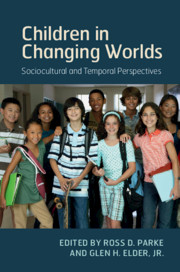Book contents
- Children in Changing Worlds
- Children in Changing Worlds
- Copyright page
- Contents
- List of Figures
- Contributor Biographies
- Preface
- Part I Theoretical and Methodological Approaches: A Cross-Disciplinary Challenge
- Part II Historical and Life Course Transitions: Economic and Demographic Change
- Part III Social, Legal, and Technological Change: Impact on Children
- Part IV Views of the Interdisciplinary Dialogue: From Developmental Science and Sociology
- 10 A Developmentalist’s Viewpoint: “It’s About Time!” Ecological Systems, Transaction, and Specificity as Key Developmental Principles in Children’s Changing Worlds
- 11 A Sociologist’s Perspective: The Historic Specificity of Development and Resilience in the Face of Increasingly Ominous Futures
- Author Index
- Subject Index
- References
11 - A Sociologist’s Perspective: The Historic Specificity of Development and Resilience in the Face of Increasingly Ominous Futures
from Part IV - Views of the Interdisciplinary Dialogue: From Developmental Science and Sociology
Published online by Cambridge University Press: 18 July 2019
- Children in Changing Worlds
- Children in Changing Worlds
- Copyright page
- Contents
- List of Figures
- Contributor Biographies
- Preface
- Part I Theoretical and Methodological Approaches: A Cross-Disciplinary Challenge
- Part II Historical and Life Course Transitions: Economic and Demographic Change
- Part III Social, Legal, and Technological Change: Impact on Children
- Part IV Views of the Interdisciplinary Dialogue: From Developmental Science and Sociology
- 10 A Developmentalist’s Viewpoint: “It’s About Time!” Ecological Systems, Transaction, and Specificity as Key Developmental Principles in Children’s Changing Worlds
- 11 A Sociologist’s Perspective: The Historic Specificity of Development and Resilience in the Face of Increasingly Ominous Futures
- Author Index
- Subject Index
- References
Summary
This chapter provides a sociological perspective on three key themes-the historically specific character of human development (do historical upheavals have differential impacts on development depending on life stage?), societal trends forecasting an increasingly problematic and challenging future (e.g., heightened inequality, economic and racial segregation, migration within and across countries, and developmental “technoference” arising from digital communication); and the countervailing capacities for resilience in children and families (e.g., successful adaptation of children despite extremely adverse circumstances, “the immigrant paradox,” and proliferation of new family forms). New research methods and directions are called for to understand the implications of the escalating pace of societal change across multiple institutional contexts for developmental outcomes. Innovative research is needed to inform policies and interventions to heighten the likelihood of more salutary futures. Such policies must address macrostructural trends that influence the meso- and micro-system level resources and opportunities available to families and children, as well as the stressors and challenges that confront them on a daily basis.
- Type
- Chapter
- Information
- Children in Changing WorldsSociocultural and Temporal Perspectives, pp. 287 - 298Publisher: Cambridge University PressPrint publication year: 2019

